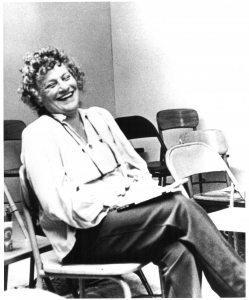This post is an esoteric one, but an important one.
I am always at a loss when I send out a side-coach and, in the words of Viola Spolin, it doesn’t penetrate. My first thought is to say it again or louder, but if it makes no sense to the players, I am only referring to my personal experience with the meaning of the side-coach phrase and probably in my head. (it happens)
I’ve seen Viola get upset when it doesn’t work, and her son, Paul Sills famously was known for being exasperated by players ‘not picking up’ on what is called out.
My first thought is what’s the problem? Don’t they understand English?
But I have to step back and see if they are misinterpreting or in trying to do it or something to please me or obey me, they get in their heads (as do I). Then I have to ask, all the questions Viola asks her coaches to ask themselves – Am I nagging? Am I expecting something they are unable to do? Is this rushing them? Should we all go home?
It is tempting to stop and explain what you want or call FREEZE! Try this! But that stops whatever flow might be happening and re-enforces your authority. There are so many ways we unconsciously want to make something happen. Not just the players, but the coach! And that is THE TRAP.
Then I came across some notes Viola wrote in preparing her second edition of on the subject of
Explore and Heighten (transformation of the beat) in the Rounding Out section of the book.
“This exercise must not be done until Transformation of an Idea (Contrapuntal Argument C) and Transformation of Relationship have been understood/integrated. (I now use the word Viola used later on – integrated) Often players fall into invention, plot, story and adlib simply because they don’t know the beats rising out of the stage life.” – Viola Spolin’s notes 1965
It is my belief that emphasis of invention, plot, story and ad-lib have become the goal of Improv in many cases. The individual beats and moment-to-moment stage life is largely ignored in favor of other structures that people are comfortable with.
The awareness of one’s own stage life in the present moment and the sharing and influencing of that moment on fellow players, is off-putting because it asks you to accept fully only the moment/action/relationship you are involved in, without any thought to those old stand-bys, story structure, scene, plot, etc. Staying present will create a series of moments that will surprise you and the audience, because what arises will be new and unknown until the moment it appears. And its appearance will lead to the next and the next and before you know it, you’re improvising.
If anyone tries to create a ‘scene’ or improvise using things like story-spine, tilts, new choice, or any other device to make something unexpected happen, not everyone will be involved. Yes, it will be funny, novel and often good for some laughs, but it is not true improvisation. One player will take on the role of initiator (offer) and expect to be yes-anded.
That is best left to a side-coach so all the players can relax and rely on each other and pay close attention to each moment and each other and whatever focus to the exclusion of all else. It is only then that we can play with a game like Explore and Heighten and let it take us to new heights of playing.
I remember my experience with Explore and Heighten in many a scene. One led me on a rollercoaster of emotion that purged me of self-pity (see How Viola Spolin Rid Me of Self-Pity) in a prison cell.
Explore and Heighten has allowed me to focus on strange things within a scene that took all of us on a ride. Another example was one time, my wife and I were in a motel and the focus was on exploring the where, but I soon noticed something on her face that I mentioned and we both explored (when coached) that led to a dynamic scene of love and passion but for the gross, stained sheets on the bed – that led to us escaping the where, thereby exploring it and ending the scene.
I could not have done that as Viola said in her notes, if I had not had my experience in Contrapuntal Argument (see blog post and videos) and Transformation of Relationship – see video.
I end in quoting the end of her note (which by the way is not in the book) “As in the other transformation exercises the moment of playing has to be apprehended and exhausted for a change (transformation) to take place.”
